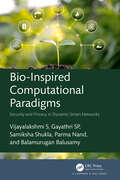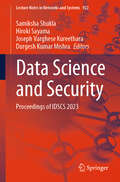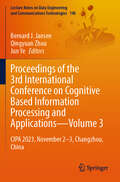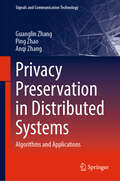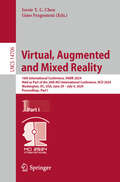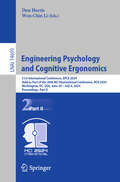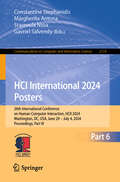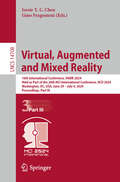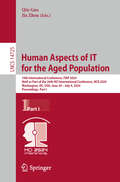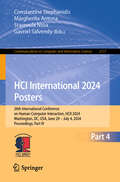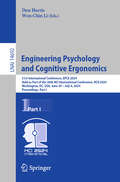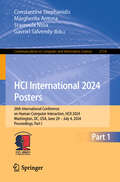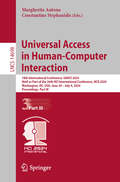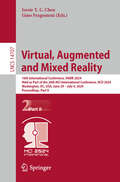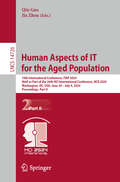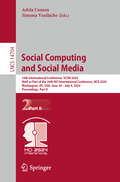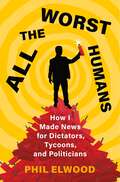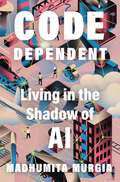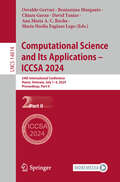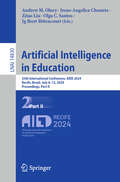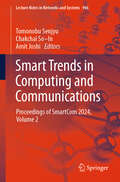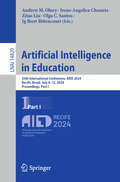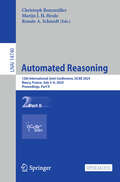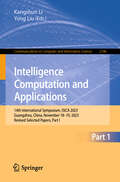- Table View
- List View
Decoding Digital Consumer Behavior: Bridging Theory and Practice
by Alfonso PellegrinoThis book is a call to adopt more ethical, sustainable, and consumer-focused approaches in the digital era. The focus on consumer perceptions and expectations in a digital context is particularly relevant, as it delves into the psychological and behavioral aspects of digital interactions. The chapters on digital consumption and risk, and memory in the digital world, are pivotal in understanding how digital mediums impact consumer choices and brand recall. Online persuasion, a key topic, explores ethical and effective strategies for influencing consumer behavior, emphasizing the importance of authenticity and trust. The discussion on social comparison and its implications in digital consumption underscores the psychological impact of digital platforms. The chapters on humanistic and sustainable marketing, and digital customer experience, reflect the growing importance of ethical, sustainable practices, and customer-centric approaches in building brand loyalty. The book is an essential guide for marketing professionals and students, offering a comprehensive understanding of the complex interplay between digital marketing strategies and consumer behavior.
Bio-Inspired Computational Paradigms: Security and Privacy in Dynamic Smart Networks
by Samiksha Shukla Parma Nand Vijayalakshmi S Gayathri SpSmart cities with various technological innovations have played an important role and influenced society as well. Due to voluminous data transactions within smart cities, security and privacy concerns need to be dealt with. Though taking care of safety and privacy is challenging, it is essential for a smart city to understand the bio-inspired computing paradigms. This book discusses the utilization of bio-inspired computing procedures for effective computational devices.• Discusses real-world usage of bio-inspired computations• Highlights how bio-inspired computations hold the potential to significantly increase network security and privacy• Talks about how society can avoid consequences of cyber security breaches• Examines the combination of bio-inspired computational methods with IoT, AI and big dataThis book is primarily aimed at graduates, researchers, IT and industry professionals.
Data Science and Security: Proceedings of IDSCS 2023 (Lecture Notes in Networks and Systems #922)
by Durgesh Kumar Mishra Hiroki Sayama Samiksha Shukla Joseph Varghese KureetharaThis book presents best-selected papers presented at the International Conference on Data Science for Computational Security (IDSCS 2023), organized by the Department of Data Science, CHRIST (Deemed to be University), Pune Lavasa Campus, India, from 02–04 November, 2023. The proceeding targets the current research works in the areas of data science, data security, data analytics, artificial intelligence, machine learning, computer vision, algorithms design, computer networking, data mining, big data, text mining, knowledge representation, soft computing, and cloud computing.
Proceedings of the 3rd International Conference on Cognitive Based Information Processing and Applications—Volume 3: CIPA 2023, November 2–3, Changzhou, China (Lecture Notes on Data Engineering and Communications Technologies #198)
by Jun Ye Bernard J. Jansen Qingyuan ZhouThis book contains papers presented at the 3rd International Conference on Cognitive- based Information Processing and Applications (CIPA) in Changzhou, China, from November 2–3, 2023. The papers represent the various technological advancements in theory, technology and application of artificial intelligence, including precision mining, intelligent computing, deep learning, and all other theories, models, and technologies related to artificial intelligence. It caters to postgraduate students, researchers, and practitioners specializing and working in the area of cognitive-inspired computing and intelligent computing. The book represents Volume 3 for this conference proceedings, which consists of a 3-volume book series.
Privacy Preservation in Distributed Systems: Algorithms and Applications (Signals and Communication Technology)
by Anqi Zhang Ping Zhao Guanglin ZhangThis book provides a discussion of privacy in the following three parts: Privacy Issues in Data Aggregation; Privacy Issues in Indoor Localization; and Privacy-Preserving Offloading in MEC. In Part 1, the book proposes LocMIA, which shifts from membership inference attacks against aggregated location data to a binary classification problem, synthesizing privacy preserving traces by enhancing the plausibility of synthetic traces with social networks. In Part 2, the book highlights Indoor Localization to propose a lightweight scheme that can protect both location privacy and data privacy of LS. In Part 3, it investigates the tradeoff between computation rate and privacy protection for task offloading a multi-user MEC system, and verifies that the proposed load balancing strategy improves the computing service capability of the MEC system. In summary, all the algorithms discussed in this book are of great significance in demonstrating the importance of privacy.
Virtual, Augmented and Mixed Reality: 16th International Conference, VAMR 2024, Held as Part of the 26th HCI International Conference, HCII 2024, Washington, DC, USA, June 29 – July 4, 2024, Proceedings, Part I (Lecture Notes in Computer Science #14706)
by Gino Fragomeni Jessie Y. C. ChenThis three-volume set LNCS 14706-14708 constitutes the refereed proceedings of the 16th International Conference on Virtual, Augmented and Mixed Reality, VAMR 2024, held as part of the 26th International Conference, HCI International 2024, in Washington, DC, USA, during June 29 – July 4, 2024. The total of 1271 papers and 309 posters included in the HCII 2024 proceedings was carefully reviewed and selected from 5108 submissions. The VAMR 2024 proceedings were organized in the following topical sections: Part I: : Perception, Interaction and Design; User Experience and Evaluation. Part II: Immersive Collaboration and Environment Design; Sensory, Tangible and Embodied Interaction in VAMR. Part III: Immersive Education and Learning; VAMR Applications and Development.
Engineering Psychology and Cognitive Ergonomics: 21st International Conference, EPCE 2024, Held as Part of the 26th HCI International Conference, HCII 2024, Washington, DC, USA, June 29 – July 4, 2024, Proceedings, Part II (Lecture Notes in Computer Science #14693)
by Don Harris Wen-Chin LiThis two-volume set LNAI 14692–14693 constitutes the thoroughly refereed proceedings of the 21st International Conference on Engineering Psychology and Cognitive Ergonomics, EPCE 2024, held as part of HCI International 2024,held in Washington, DC, USA, during June 29 - July 4, 2024. The total of 1271 papers and 309 posters included in the HCII 2024 proceedings was carefully reviewed and selected from 5108 submissions. The papers included in the HCII-EPCE two-volume set were organized in topical sections as follows: Part I: Cognitive Processes and Performance in High-Stress Environments; Decision-Making Support and Automation. Part II: Engineering Psychology and User Experience; Human Factors in Aviation.
HCI International 2024 Posters: 26th International Conference on Human-Computer Interaction, HCII 2024, Washington, DC, USA, June 29 – July 4, 2024, Proceedings, Part VI (Communications in Computer and Information Science #2119)
by Gavriel Salvendy Margherita Antona Constantine Stephanidis Stavroula NtoaThe seven-volume set CCIS 2114-2120 contains the extended abstracts of the posters presented during the 26th International Conference on Human-Computer Interaction, HCII 2024, held in Washington, DC, USA, during June 29–July 4, 2024. The total of 1271 papers and 309 posters included in the HCII 2024 proceedings were carefully reviewed and selected from 5108 submissions. The posters presented in these seven volumes are organized in the following topical sections: Part I: HCI Design Theories, Methods, Tools and Case Studies; User Experience Evaluation Methods and Case Studies; Emotions in HCI; Human Robot Interaction. Part II: Inclusive Designs and Applications; Aging and Technology. Part III: eXtended Reality and the Metaverse; Interacting with Cultural Heritage, Art and Creativity. Part IV: HCI in Learning and Education; HCI in Games. Part V: HCI in Business and Marketing; HCI in Mobility and Automated Driving; HCI in Psychotherapy and Mental Health. Part VI: Interacting with the Web, Social Media and Digital Services; Interaction in the Museum; HCI in Healthcare. Part VII: AI Algorithms and Tools in HCI; Interacting with Large Language Models and Generative AI; Interacting in Intelligent Environments; HCI in Complex Industrial Environments.
Virtual, Augmented and Mixed Reality: 16th International Conference, VAMR 2024, Held as Part of the 26th HCI International Conference, HCII 2024, Washington, DC, USA, June 29 – July 4, 2024, Proceedings, Part III (Lecture Notes in Computer Science #14708)
by Gino Fragomeni Jessie Y. C. ChenThis three-volume set LNCS 14706-14708 constitutes the refereed proceedings of the 16th International Conference on Virtual, Augmented and Mixed Reality, VAMR 2024, held as part of the 26th International Conference, HCI International 2024, in Washington, DC, USA, during June 29 – July 4, 2024. The total of 1271 papers and 309 posters included in the HCII 2024 proceedings was carefully reviewed and selected from 5108 submissions. The VAMR 2024 proceedings were organized in the following topical sections: Part I: : Perception, Interaction and Design; User Experience and Evaluation. Part II: Immersive Collaboration and Environment Design; Sensory, Tangible and Embodied Interaction in VAMR. Part III: Immersive Education and Learning; VAMR Applications and Development.
Human Aspects of IT for the Aged Population: 10th International Conference, ITAP 2024, Held as Part of the 26th HCI International Conference, HCII 2024, Washington, DC, USA, June 29–July 4, 2024, Proceedings, Part I (Lecture Notes in Computer Science #14725)
by Jia Zhou Qin GaoThis two-volume set LNCS 14725-14726 constitutes the thoroughly refereed proceedings of the 10th International Conference on Human Aspects of IT for the Aged Population (ITAP 2024), held as part of the 26th International Conference on Human-Computer Interaction, HCI International 2024 (HCII 2024), was held as a hybrid event in Washington DC, USA, during June/July 2024. The total of 1271 papers and 309 posters included in the HCII 2023 proceedings was carefully reviewed and selected from 5108 submissions. The ITAP 2024 conference offers a broad range of relevant disciplines and domains to exchange 1) research contributions on older people's abilities and competencies, needs and requirements, and attitudes and behavioral patterns in relation to IT use; 2) innovative ideas, practices, and experiences related to the design, operation, and evaluation of IT applications, systems, and services for older people.
HCI International 2024 Posters: 26th International Conference on Human-Computer Interaction, HCII 2024, Washington, DC, USA, June 29–July 4, 2024, Proceedings, Part IV (Communications in Computer and Information Science #2117)
by Gavriel Salvendy Margherita Antona Constantine Stephanidis Stavroula NtoaThe seven-volume set CCIS 2114-2120 contains the extended abstracts of the posters presented during the 26th International Conference on Human-Computer Interaction, HCII 2024, held in Washington, DC, USA, during June 29–July 4, 2024. The total of 1271 papers and 309 posters included in the HCII 2024 proceedings were carefully reviewed and selected from 5108 submissions. The posters presented in these seven volumes are organized in the following topical sections: Part I: HCI Design Theories, Methods, Tools and Case Studies; User Experience Evaluation Methods and Case Studies; Emotions in HCI; Human Robot Interaction. Part II: Inclusive Designs and Applications; Aging and Technology. Part III: eXtended Reality and the Metaverse; Interacting with Cultural Heritage, Art and Creativity. Part IV: HCI in Learning and Education; HCI in Games. Part V: HCI in Business and Marketing; HCI in Mobility and Automated Driving; HCI in Psychotherapy and Mental Health. Part VI: Interacting with the Web, Social Media and Digital Services; Interaction in the Museum; HCI in Healthcare. Part VII: AI Algorithms and Tools in HCI; Interacting with Large Language Models and Generative AI; Interacting in Intelligent Environments; HCI in Complex Industrial Environments.
Engineering Psychology and Cognitive Ergonomics: 21st International Conference, EPCE 2024, Held as Part of the 26th HCI International Conference, HCII 2024, Washington, DC, USA, June 29 – July 4, 2024, Proceedings, Part I (Lecture Notes in Computer Science #14692)
by Don Harris Wen-Chin LiThis two-volume set LNAI 14692–14693 constitutes the thoroughly refereed proceedings of the 21st International Conference on Engineering Psychology and Cognitive Ergonomics, EPCE 2024, held as part of HCI International 2024,held in Washington, DC, USA, during June 29 - July 4, 2024. The total of 1271 papers and 309 posters included in the HCII 2024 proceedings was carefully reviewed and selected from 5108 submissions. The papers included in the HCII-EPCE two-volume set were organized in topical sections as follows: Part I: Cognitive Processes and Performance in High-Stress Environments; Decision-Making Support and Automation. Part II: Engineering Psychology and User Experience; Human Factors in Aviation.
HCI International 2024 Posters: 26th International Conference on Human-Computer Interaction, HCII 2024, Washington, DC, USA, June 29–July 4, 2024, Proceedings, Part I (Communications in Computer and Information Science #2114)
by Gavriel Salvendy Margherita Antona Constantine Stephanidis Stavroula NtoaThe seven-volume set CCIS 2114-2120 contains the extended abstracts of the posters presented during the 26th International Conference on Human-Computer Interaction, HCII 2024, held in Washington, DC, USA, during June 29–July 4, 2024. The total of 1271 papers and 309 posters included in the HCII 2024 proceedings were carefully reviewed and selected from 5108 submissions. The posters presented in these seven volumes are organized in the following topical sections: Part I: HCI Design Theories, Methods, Tools and Case Studies; User Experience Evaluation Methods and Case Studies; Emotions in HCI; Human Robot Interaction. Part II: Inclusive Designs and Applications; Aging and Technology. Part III: eXtended Reality and the Metaverse; Interacting with Cultural Heritage, Art and Creativity. Part IV: HCI in Learning and Education; HCI in Games. Part V: HCI in Business and Marketing; HCI in Mobility and Automated Driving; HCI in Psychotherapy and Mental Health. Part VI: Interacting with the Web, Social Media and Digital Services; Interaction in the Museum; HCI in Healthcare. Part VII: AI Algorithms and Tools in HCI; Interacting with Large Language Models and Generative AI; Interacting in Intelligent Environments; HCI in Complex Industrial Environments.
Universal Access in Human-Computer Interaction: 18th International Conference, UAHCI 2024, Held as Part of the 26th HCI International Conference, HCII 2024, Washington, DC, USA, June 29 – July 4, 2024, Proceedings, Part III (Lecture Notes in Computer Science #14698)
by Margherita Antona Constantine StephanidisThis three-volume set LNCS 14696-14698 constitutes the refereed proceedings of the 18th International Conference on Universal Access in Human-Computer Interaction, UAHCI 2024, held as part of the 26th International Conference, HCI International 2024, in Washington, DC, USA, during June 29 – July 4, 2024. The total of 1271 papers and 309 posters included in the HCII 2024 proceedings was carefully reviewed and selected from 5108 submissions. The UAHCI 2024 proceedings were organized in the following topical sections: Part I: User Experience Design and Evaluation for Universal Access; AI for Universal Access. Part II: Universal Access to Digital Services; Design for Cognitive Disabilities; Universal Access to Virtual and Augmented Reality. Part III: Universal Access to Learning and Education; Universal Access to Health and Wellbeing; Universal Access to Information and Media.
Virtual, Augmented and Mixed Reality: 16th International Conference, VAMR 2024, Held as Part of the 26th HCI International Conference, HCII 2024, Washington, DC, USA, June 29 – July 4, 2024, Proceedings, Part II (Lecture Notes in Computer Science #14707)
by Gino Fragomeni Jessie Y. C. ChenThis three-volume set LNCS 14706-14708 constitutes the refereed proceedings of the 16th International Conference on Virtual, Augmented and Mixed Reality, VAMR 2024, held as part of the 26th International Conference, HCI International 2024, in Washington, DC, USA, during June 29 – July 4, 2024. The total of 1271 papers and 309 posters included in the HCII 2024 proceedings was carefully reviewed and selected from 5108 submissions. The VAMR 2024 proceedings were organized in the following topical sections: Part I: : Perception, Interaction and Design; User Experience and Evaluation. Part II: Immersive Collaboration and Environment Design; Sensory, Tangible and Embodied Interaction in VAMR. Part III: Immersive Education and Learning; VAMR Applications and Development.
Human Aspects of IT for the Aged Population: 10th International Conference, ITAP 2024, Held as Part of the 26th HCI International Conference, HCII 2024, Washington, DC, USA, June 29–July 4, 2024, Proceedings, Part II (Lecture Notes in Computer Science #14726)
by Jia Zhou Qin GaoThis two-volume set LNCS 14725-14726 constitutes the thoroughly refereed proceedings of the 10th International Conference on Human Aspects of IT for the Aged Population (ITAP 2024), held as part of the 26th International Conference on Human-Computer Interaction, HCI International 2024 (HCII 2024), was held as a hybrid event in Washington DC, USA, during June/July 2024. The total of 1271 papers and 309 posters included in the HCII 2023 proceedings was carefully reviewed and selected from 5108 submissions. The ITAP 2024 conference offers a broad range of relevant disciplines and domains to exchange 1) research contributions on older people's abilities and competencies, needs and requirements, and attitudes and behavioral patterns in relation to IT use; 2) innovative ideas, practices, and experiences related to the design, operation, and evaluation of IT applications, systems, and services for older people.
Social Computing and Social Media: 16th International Conference, SCSM 2024, Held as Part of the 26th HCI International Conference, HCII 2024, Washington, DC, USA, June 29–July 4, 2024, Proceedings, Part II (Lecture Notes in Computer Science #14704)
by Adela Coman Simona VasilacheThis book constitutes the refereed proceedings of the 16th International Conference on Social Computing and Social Media, SCSM 2024, held as part of the 26th HCI International Conference, HCII 2024, which took place in Washington, DC, USA, during June 29–July 4, 2024. The total of 1271 papers and 309 posters included in the HCII 2024 proceedings was carefully reviewed and selected from 5108 submissions. The SCSM 2024 proceedings were organized in the following topical sections: Part I: Designing, developing and evaluating social media; user experience and user behavior in social media; AI and language models in social media; Part II: Social media in learning, education and culture; social media in business and ecommerce; Part III: Computer-mediated communication; social media for community, society and democracy.
All the Worst Humans: How I Made News for Dictators, Tycoons, and Politicians
by Phil Elwood"A rollicking, unexpectedly affecting story. . . It’s going to be one of the big, buzzy Beltway books of the year."—PoliticoA bridge-burning, riotous memoir by a top PR operative in Washington who exposes the secrets of the $129-billion industry that controls so much of what we see and hear in the media—from a man who used to pull the strings, and who is now pulling back the curtain.After nearly two decades in the Washington PR business, Elwood wants to come clean, by exposing the dark underbelly of the very industry that’s made him so successful. The first step is revealing exactly what he’s been up to for the past twenty years—and it isn’t pretty. Elwood has worked for a murderer’s row of questionable clients, including Gaddafi, Assad, and the government of Qatar. In All the Worst Humans, Elwood unveils how the PR business works, and how the truth gets made, spun, and sold to the public—not shying away from the gritty details of his unlikely career.This is a piercing look into the corridors of money, power, politics, and control, all told in Elwood’s disarmingly funny and entertaining voice. He recounts a four-day Las Vegas bacchanal with a dictator’s son, plotting communications strategies against a terrorist organization in Western Africa, and helping to land a Middle Eastern dictator’s wife a glowing profile in Vogue on the same time the Arab Spring broke out. And he reveals all his slippery tricks for seducing journalists in order to create chaos and ultimately cover for politicians, dictators, and spies—the industry-secret tactics that led to his rise as a political PR pro. Along the way, Phil walks the halls of the Capitol, rides in armored cars through Abuja, and watches his client lose his annual income at the roulette table. But as he moved up the ranks, he felt worse and worse about the sleaziness of it all—until Elwood receives a shocking wake-up call from the FBI. This risky game nearly cost Elwood his life and his freedom. Seeing the light, Elwood decides to change his ways, and his clients, and to tell the full truth about who is the worst human.
Code Dependent: Living in the Shadow of AI
by Madhumita MurgiaShortlisted for the Women’s Prize for Non-FictionA riveting story of what it means to be human in a world changed by artificial intelligence, revealing the perils and inequities of our growing reliance on automated decision-makingOn the surface, a British poet, an UberEats courier in Pittsburgh, an Indian doctor, and a Chinese activist in exile have nothing in common. But they are in fact linked by a profound common experience—unexpected encounters with artificial intelligence. In Code Dependent, Murgia shows how automated systems are reshaping our lives all over the world, from technology that marks children as future criminals, to an app that is helping to give diagnoses to a remote tribal community. AI has already infiltrated our day-to-day, through language-generating chatbots like ChatGPT and social media. But it’s also affecting us in more insidious ways. It touches everything from our interpersonal relationships, to our kids’ education, work, finances, public services, and even our human rights.By highlighting the voices of ordinary people in places far removed from the cozy enclave of Silicon Valley, Code Dependent explores the impact of a set of powerful, flawed, and often-exploitative technologies on individuals, communities, and our wider society. Murgia exposes how AI can strip away our collective and individual sense of agency, and shatter our illusion of free will. The ways in which algorithms and their effects are governed over the coming years will profoundly impact us all. Yet we can’t agree on a common path forward. We cannot decide what preferences and morals we want to encode in these entities—or what controls we may want to impose on them. And thus, we are collectively relinquishing our moral authority to machines.In Code Dependent, Murgia not only sheds light on this chilling phenomenon, but also charts a path of resistance. AI is already changing what it means to be human, in ways large and small, and Murgia reveals what could happen if we fail to reclaim our humanity.
Computational Science and Its Applications – ICCSA 2024: 24th International Conference, Hanoi, Vietnam, July 1–4, 2024, Proceedings, Part II (Lecture Notes in Computer Science #14814)
by Osvaldo Gervasi Beniamino Murgante Ana Maria A. C. Rocha David Taniar Chiara Garau Maria Noelia Faginas LagoThe two-volume LNCS set 14813 and 14814 constitutes the refereed proceedings of the 24th International Conference on Computational Science and Its Applications, ICCSA 2024, held in Hanoi, Vietnam, during July 1–4, 2024. The 53 full papers, 6 short papers and 3 PHD showcase papers included in these volumes were carefully reviewed and selected from a total of 207 submissions. The papers focus on the following six sub-areas within Computer Science and its Applications: Computational Methods, Algorithms and Scientific Applications; High Performance Computing and Networks; Geometric Modeling, Graphics and Visualization; Advanced and Emerging Applications; Information Systems and Technologies & Urban and Regional Planning.
Artificial Intelligence in Education: 25th International Conference, AIED 2024, Recife, Brazil, July 8–12, 2024, Proceedings, Part II (Lecture Notes in Computer Science #14830)
by Olga C. Santos Ig Ibert Bittencourt Irene-Angelica Chounta Andrew M. Olney Zitao LiuThis book constitutes the refereed proceedings of the 25th International Conference on Artificial Intelligence in Education, AIED 2024, held in Recife, Brazil, in July 8–12, 2024, Proceedings. The 49 full papers and 27 short papers presented in this book were carefully reviewed and selected from 334 submissions. The papers present result in high-quality research on intelligent systems and the cognitive sciences for the improvement and advancement of education.
Smart Trends in Computing and Communications: Proceedings of SmartCom 2024, Volume 2 (Lecture Notes in Networks and Systems #946)
by Amit Joshi Tomonobu Senjyu Chakchai So–InThis book gathers high-quality papers presented at the Eighth International Conference on Smart Trends in Computing and Communications (SmartCom 2024), organized by Global Knowledge Research Foundation (GR Foundation) from 12 to 13 January 2024 in Pune, India. It covers the state-of-the-art and emerging topics in information, computer communications, and effective strategies for their use in engineering and managerial applications. It also explores and discusses the latest technological advances in, and future directions for, information and knowledge computing and its applications.
Artificial Intelligence in Education: 25th International Conference, AIED 2024, Recife, Brazil, July 8–12, 2024, Proceedings, Part I (Lecture Notes in Computer Science #14829)
by Olga C. Santos Ig Ibert Bittencourt Irene-Angelica Chounta Andrew M. Olney Zitao LiuThis book constitutes the refereed proceedings of the 25th International Conference on Artificial Intelligence in Education, AIED 2024, held in Recife, Brazil, in July 8–12, 2024, Proceedings. The 49 full papers and 27 short papers presented in this book were carefully reviewed and selected from 334 submissions. The papers present results in high-quality research on intelligent systems and the cognitive sciences for the improvement and advancement of education.
Automated Reasoning: 12th International Joint Conference, IJCAR 2024, Nancy, France, July 3–6, 2024, Proceedings, Part II (Lecture Notes in Computer Science #14740)
by Renate A. Schmidt Christoph Benzmüller Marijn J. H. HeuleInfotext (nur auf Basis des Vorgängers): This two-volume set of LNAI 14739-14740 constitute the proceedings of the 12th International Joint Conference on Automated Reasoning, IJCAR 2024, held in Nancy, France, during July 3-6, 2024. The 39 full research papers and 6 short papers presented in this book were carefully reviewed and selected from 115 submissions. The papers focus on the following topics: theorem proving and tools; SAT, SMT and Quantifier Elimination; Intuitionistic Logics and Modal Logics; Calculi, Proof Theory and Decision Procedures; and Unification, Rewriting and Computational Models. This book is open access.
Intelligence Computation and Applications: 14th International Symposium, ISICA 2023, Guangzhou, China, November 18–19, 2023, Revised Selected Papers, Part I (Communications in Computer and Information Science #2146)
by Yong Liu Kangshun LiThis two-volume set, CCIS 2146 and CCIS 2147, constitutes the refereed proceedings of the 14th International Symposium on Intelligence Computation and Applications, ISICA 2023, held in Guangzhou, China, during November 18–19, 2023. The 82 full papers included in these proceedings were carefully reviewed and selected from 178 submissions. The papers presented in these two volumes are organized in the following topical sections: Part I: Frontiers of evolutionary Intelligent Optimization Algorithms; Exploration of computer vision; Machine learning and its applications. Part II: Machine Learning and its applications; Big data analysis and Information security; Intelligent application of computer.

